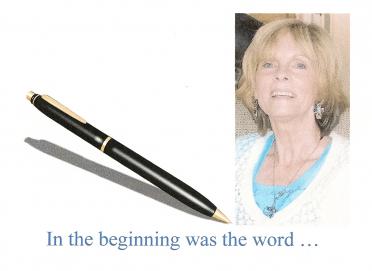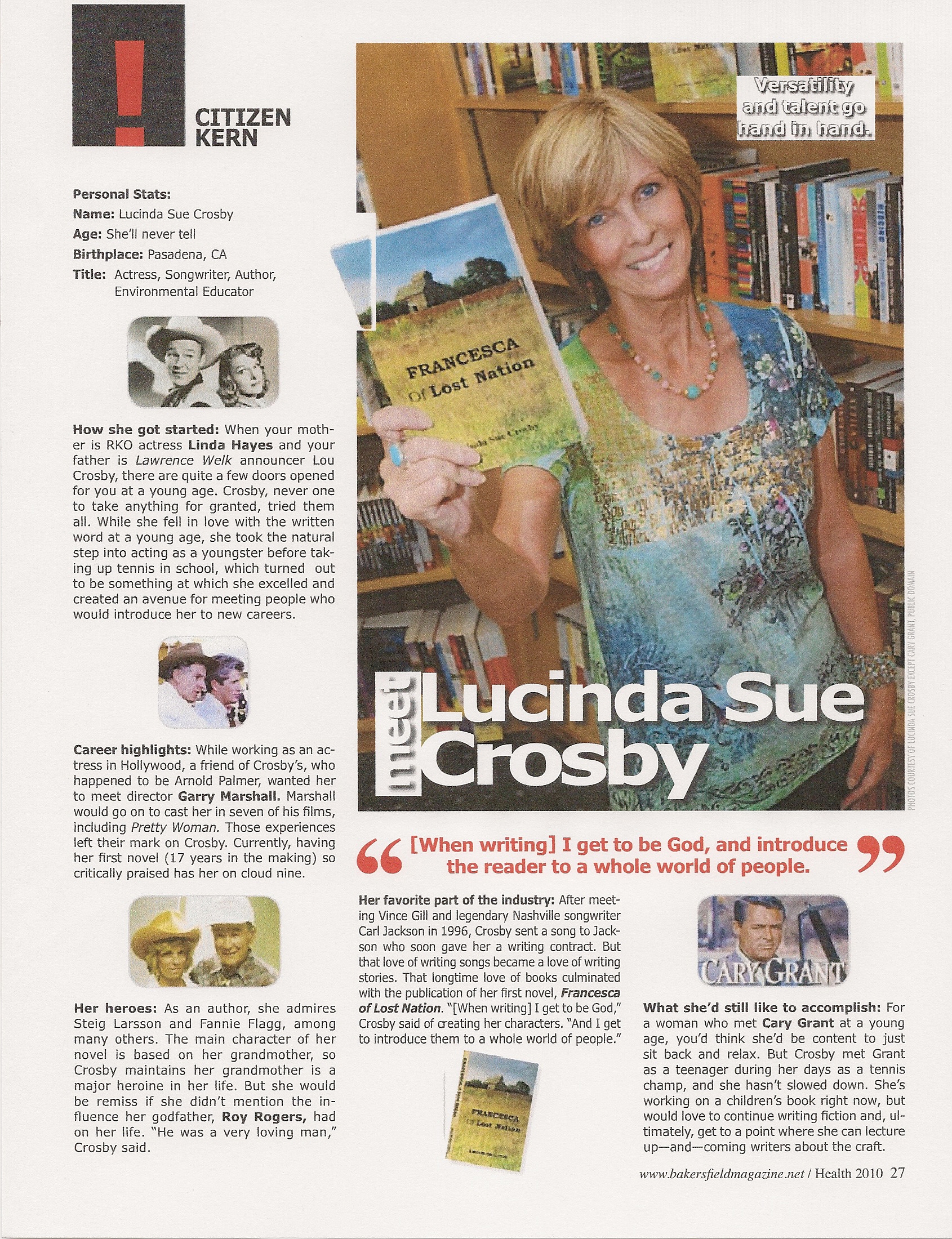Lucinda Sue Crosby is an accomplished poet, lyricist, actress, and was at one time a professional tennis player. She’s the daughter of a Hollywood actress and a TV announcer, who grew up surrounded by glamorous actors and athletes. One could say she’s lived quite a life, but putting it in past tense wouldn’t make sense — she still is. Despite all her success so far, this modern day Renaissance woman is adding one more title to her long list of accomplishments — author.
Earlier this year, Lucinda published her first book, Francesca of Lost Nation. I was lucky enough to hear her speak right here in Bakersfield just a few weeks ago, and I was hard pressed to pick her brain for more. She talked not only about what inspired her book but also her illustrious career, how she beats writers block, and the strong women who inspired her on her journey.
How did the people you grew up with, including your parents, help shape your creativity as an adult?
I come from a long line of creative people — my father was into music and he wrote commercials. He went to college when he was 13. He was an English major and he loved words. My grandmother first woman to go to college in her county, also an English major. My mother was an actress and went to the Pasedena play house from the time she was about 14 or 15. There was always a love of words plays and books and music from the time I was little; I was surrounded by it.
What was your life like growing up with a famous mother and father?
Both of my parents were well known in Hollywood; my dad was a voice over announcer on TV for many years. They called him the voice; his name was Lou Crosby and people in the biz knew him very well. Because we hung out with people who were a lot more famous than them, they didn’t feel very famous to me! My godparents were Roy Rodgers and Dale Evans, my mother had made movies with Lucille Ball and we’d run into her shopping in Pasedena sometimes, and we knew all the great champions in tennis, so those people always seemed a lot more famous than my parents.
What inspired you to write your book, Francesca of Lost Nation?
I don’t know if you’ve ever had someone in your life who made you think and made you feel, and was attractive, charismatic, and well spoken. And told great stories. And was also very supportive. That was my grandmother to me — she was a race car driver, she never lost a county race in her life. She was a poker player, she went to college, and she had so many wonderful attributes. She embraced the future even after age 40; she was relevant and she was never invisible. That is something that women are still struggling with today. How many people do you know that can not stand change? This is a woman who was born in 1893 and she welcomed change. So, as life is developing, changing, veering west and veering east, she went along with it. That quality of reinventing yourself, staying relevant and busy — I think, how can you not write something about a character like that?
What was the process of getting published like?
I started writing it 17 years ago. About 2 years ago Laura, my boss at the newspaper, said we need to get it published. It was just a matter of getting it on the internet, and going through contacting and finding out which people are having which kind of experiences, and what they’re looking for. It’s a trial of process trial and error. In the meantime, we’re polishing it as it goes along. It’s a painstaking process — we didn’t have a Sarah Palin, $1 million sign up — we’re having to do it ourselves, but I don’t mind that because its a labor of love
Why should people buy your book?
I think it talks about the value of having the older generation around to talk about the struggles, and difficulties, and make you laugh at yourself, and to show how graceful life can be. I think the relationship between Sarah and her grandmother Francesca is something people will recognize, especially if they have a favorite grandmother, or grandfather or uncle — someone older in the family that loves children and doesn’t forget what its like to be a child. It’s about women staying relevant and visible. Look at everything Hilary Clinton has had to do to stay visible! It’s easy when you,re young and attractive, as a woman, to do it, but when you’re older it’s creativity that comes to the fore. My grandmother was extremely optimistic — I think having those view points actually helps you experience life in a joyful way even when life is not joyful.
How does the process of song writing differ from writing novels and poems for you?
All the other writing I do is solitary; journalism, columns, books, poetry. I sit in a room gather all ideas do research. The thing about songwriting that I actually adore is you’re sitting in a room with someone else, and a lot of times they have more experience and success than I, and a lot of times they know more about the structure of songwriting. The words for me — when you come up with something, and there’s sort of a….it’s like living lightening, jumping back and forth between the two people, its exciting and wonderful, and you get on fire and you start galloping, and it gathers its own momentum. What I like least is structure; most, it’s co-writing. I like sharing that creative spark with others.
What is your most memorable experience from working with your famous clients?
In 1995 I met Arnold Palmer for the first time; he was a great golf champion. He had his own army; he was so charismatic that people would gather and be in “Arnies Army” all over the U.S. He started playing senior events in Palm Springs and he had these best friends — I’d run into him and his friends and they discovered I was a songwriter and had just gotten a deal in Nashville. We talked about all the great things he’d ever done for them — getting them tickets or sneaking the into banquets. They were friends for 34 years some of them. They had thrown a party at a country club during PGE championships, but when he left early he had paid the bill on his way out. So they wanted to give him something he couldn’t pay for in advance, so that’s what we did [a poem]. Heart of the Man is on a monument in his club in Bayhill, Florida.
Do you ever get writers block, and if so, what do you do to cure it?
I think if I get a block over here I go over someplace else. Right now, I’m doing PR for my work –I’m an environment/water educator — or I’m editing a children’s book. So if I’m having trouble over here I go write something else for a while.
You’ve said that everyone has a novel in them. What would you recommend a person do to make it a reality?
First of all I think you have to recognize the stories in your own lifetime that resonate in others. You have to know yourself well , and emotions, and what makes people think. Most people have struggled, or have had a love affair….maybe it’s what their parents did, but there’s something about their life that is so unique and moving. So you begin to gather ideas about it, and what you could put in, and you have 20-30 ideas, words, or titles, and you put them in order. One day I just started to write and I kind of knew where I was going. A lot of the stories in the novel are fictional, a lot are true, but the outline of the book was always my grandma’s character and the relationship between her and the granddaughter. There has to be peril, tension, and a struggle of some kind, and you have to see characters change over time. Those are the things I think are story telling.
What are you reading right now?
I’m a big fan of Steig Larsson –The Girl With the Dragon Tattoo — I think he’s a phenomenal writer. His stories gallop along, they’re gut-wrenching and you root for the heroine — she’s not like any heroine I’ve seen before! Lisbeth Sander, I love her intelligence, her toughness, and that she can survive — I love that. Occasionally I like to go back and read the classics; I don’t think any time is the wrong time for Jane Austen. Sometimes if you just want a really good read with a nice chuckle, It’s like an old friend. Im a big fan of Barack Obama as a writer; his writing is emotional and educated without being preachy. I really like the way that he develops themes. I like people like Fannie Flagg — I like women writers I like and books with great women characters, and how the story develops with the characters.
Is there anything else you’d like readers to know about you and/or your book?
Having the chance to appear with the Writers Association of Bakersfield — the people there, you can feel her expertise their experience their passion. I’m looking forward to doing more than that. Im already getting an idea of a book about writing groups! If you know my writing you know me, the things I care about. I feel so lucky to have this opportunity. To be able to share my vision of a remarkable person and a remarkable relationship with other people; it makes me feel humble.



.jpg)
.jpg)

